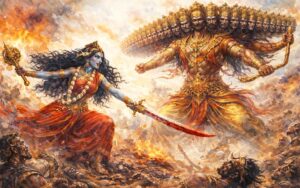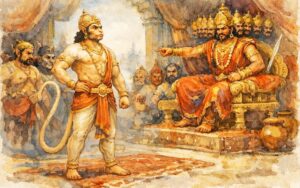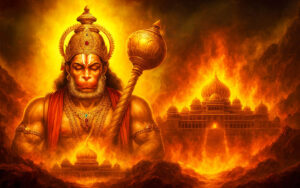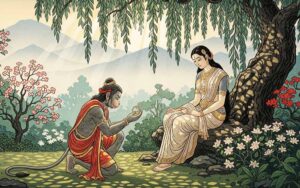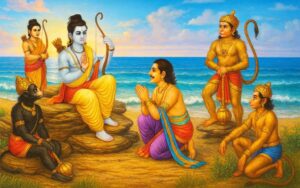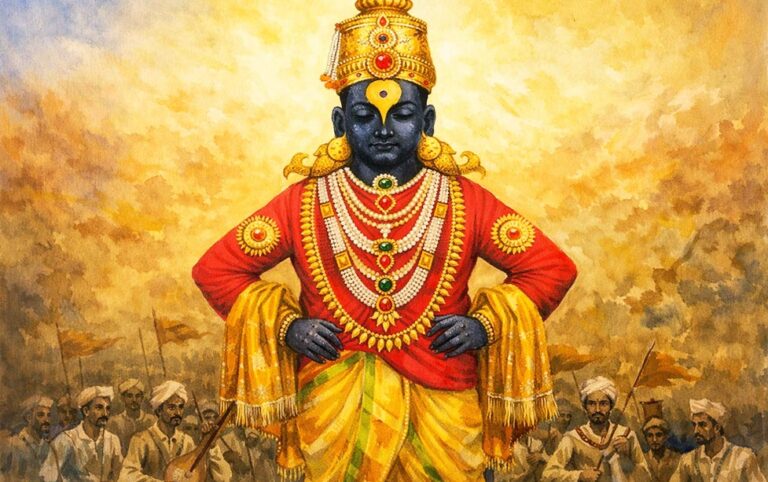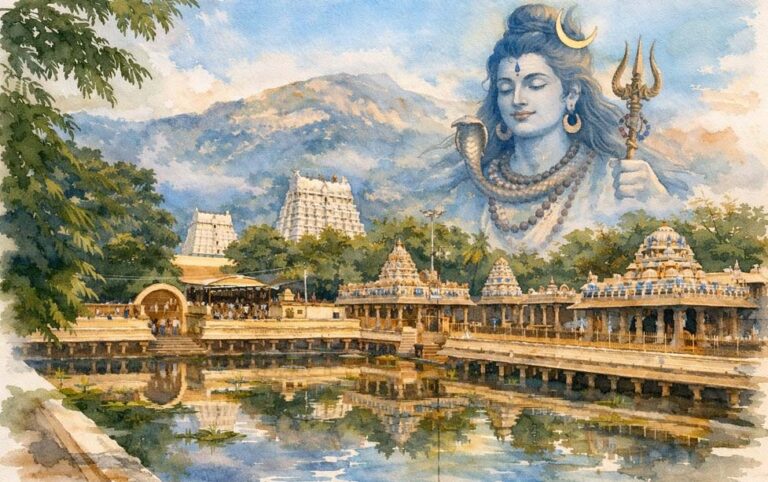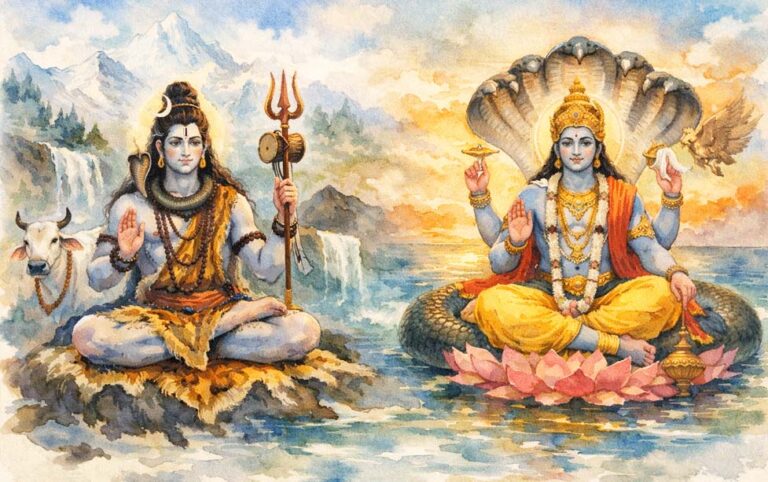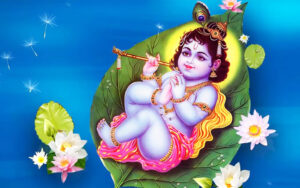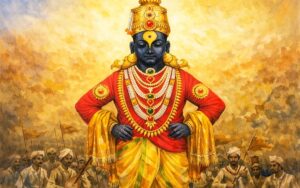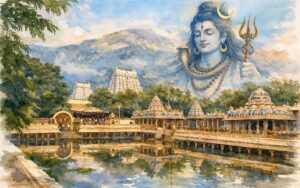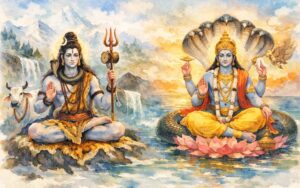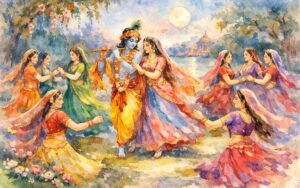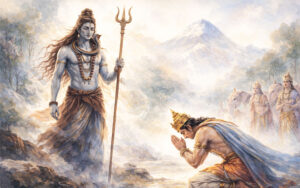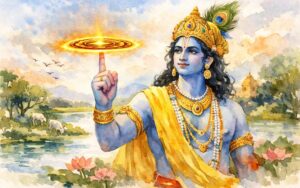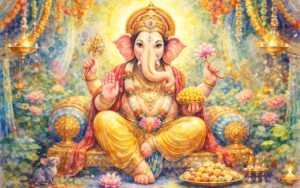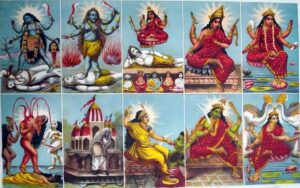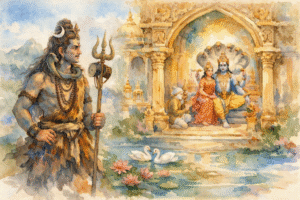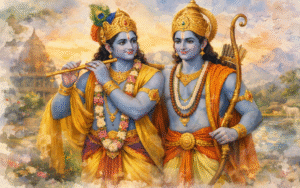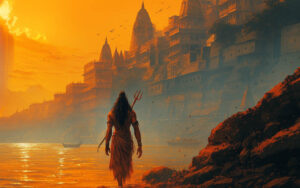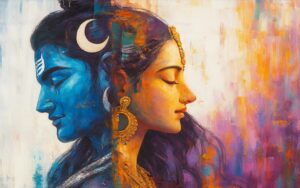
No time for reading the story? Give it a listen on Spotify.

An Odia tale of devotion where Hanuman, offered a sweet by Rama, sees Lord Jagannath in his reflection instead.
Characters in the story:
Lord Rama: Lord Rama is one of the most revered deities in Hinduism and is the seventh avataar of Lord Vishnu. He is known for his virtues of righteousness, courage, and devotion, and is considered a symbol of ideal human behavior and the victory of good over evil.
![]()
Lord Hanuman: Lord Hanuman is a revered deity in Hinduism, known for his unwavering devotion to Lord Rama and his incredible strength, symbolizing courage, loyalty, and selflessness.
![]()
Lord Jagannath: Jagannatha means Lord of the Universe is a deity worshiped in regional Hindu traditions in India as part of a triad along with his brother Balabhadra, and sister, Subhadra. Jagannath, within Odia traditions, is the supreme god, Purushottama, and the Para Brahman.
This story originates from the Odia Ramayanas, specifically the Jagamohana Ramayana written by Balarama Dasa, which is part of Jagannath Temple lore. It also explains the presence and significance of Hanuman in the Jagannath Temple.
The grand feast of Mahabhoj was in full swing. Ayodhya, radiant with victory and the return of its beloved king, overflowed with joy. The palace halls echoed with music, laughter, and the clatter of golden plates. At the heart of it all sat Lord Rama, resplendent, with Mata Sita by his side, bestowing blessings and gratitude upon his loyal allies.
Hanuman, ever-present, sat humbly near Rama’s feet, his eyes fixed solely on his Lord, absorbing every gesture, every smile. His devotion was a quiet, radiant warmth in the bustling hall.
As platters laden with delicacies circulated, Rama himself picked up a particularly large, glistening sweet, floating in fragrant syrup. It was said to be the finest, made by the best chefs any kitchen had to offer. With a tender smile directed at his most devoted servant, Rama extended the sweet toward Hanuman.
“Hanuman,” Rama said, his voice warm, “Take this. Savour its sweetness. You, who crossed oceans and moved mountains for me, deserve the finest nectar of this celebration.”
A ripple of appreciation went through the assembled courtiers. To be personally served by Lord Rama was the highest honor.
Hanuman bowed deeply, accepting the sweet with reverence. “Prabhu, your grace is sweeter than any nectar,” he murmured. He held the soft, syrupy sweet in his palm. But instead of immediately eating it, he did something curious.
His gaze lifted—not to the sweet, but to a large, ornate, silver-framed mirror hanging on the pillar behind Rama’s throne. He stared intently into the reflection within the mirror.
Rama, noticing this, paused. A gentle frown of confusion touched his brow. “Hanuman? Is the sweet not to your liking? Why do you gaze at the mirror instead?”
Hanuman didn’t reply immediately, his focus unwavering on the mirrored image. He slowly brought the sweet closer to his lips, but his eyes remained locked on the reflection.
Courtiers began to whisper. Was the great Hanuman distracted? Was he admiring his own reflection? Some stifled chuckles. Sugriva nudged Vibhishana, sharing a puzzled look.
Rama, patient but increasingly curious, leaned forward slightly. “Hanuman? Tell me, my friend, what holds your gaze so firmly in that mirror? Does the reflection please you more than the gift I offer?”
Finally, Hanuman lowered the untouched sweet. He turned his luminous eyes, filled with profound emotion, toward Rama. There was no hint of distraction—only a depth of understanding that silenced the whispers.
“Forgive me, Prabhu,” Hanuman’s voice was soft, yet it carried through the hall. “The sweet is indeed the finest, a gift from your own hand, sweeter than ambrosia itself. But, my Lord…”
He paused, his gaze flickering back to the mirror for a moment, then returning to Rama’s face with overwhelming love. “When I look at the sweet, held in my mortal hand, I see only a sweet. Delicious, yes, but fleeting. It nourishes the body for but a moment.”
He gestured toward the mirror. “But when I look there, Prabhu, when I see your reflection in the mirror…”
A collective breath was held.
“I do not see merely King Rama of Ayodhya,” Hanuman continued, his voice trembling with awe. “Within that reflection, I see the universe. I see the swirling galaxies, the birth and death of stars, the mountains that scrape the sky, the oceans that cradle life, the dance of creation and dissolution. I see the boundless cosmos contained within your form. I see… Jagannath.”
A profound silence descended. The word Jagannath—Lord of the Universe—hung in the air, charged with meaning.
“In your reflection, Prabhu,” Hanuman whispered, his eyes shimmering, “I see the source of all sweetness, the sustainer of all life, the very essence of existence. That sight, that darshan… it nourishes my soul. It fills me with a bliss that no earthly sweet, however fine, could ever hope to match. It is the nectar of immortality. That is why I gaze upon your reflection. For in it, I behold not just my king, but my very God, the Lord of All.”
Tears welled in Rama’s eyes. He understood. Hanuman’s devotion wasn’t bound by form; it pierced through the mortal king to perceive the infinite divine within. The offering of the sweet was an act of love from Rama, but Hanuman’s focus on the reflection was the ultimate act of seeing, of recognizing the divine essence.
Rama reached out—not for the sweet—but placed a hand gently on Hanuman’s bowed head. “Oh, Hanuman,” he murmured, his voice thick with emotion. “You alone see truly. You alone perceive the ocean within the drop. Your devotion is the mirror that reflects the purest truth.”
He looked around at the stunned courtiers, then back at Hanuman, his gaze filled with profound respect and love. “This sweet,” Rama said softly, picking up the untouched sweet from Hanuman’s palm, “is merely sugar and milk. But your vision, Hanuman… your vision is the true prasad. It is the blessing upon me this day.”
And as Hanuman finally smiled, his gaze returning lovingly to Rama’s face, the untouched sweet remained on the plate—a silent testament to a devotion that found its ultimate sweetness not in the taste of the world, but in the boundless vision of the divine within its Lord. In that moment, in the heart of Ayodhya, the spirit of Jagannath had been truly seen, reflected in the unwavering gaze of the humble devotee of Rama—Hanuman.
![]()
Author’s note:
While one may question the timeline—since Jagannath’s presene and worship became prominent in Kali Yuga, whereas Rama and Hanuman belong to Treta Yuga—the deeper truth transcends chronology. Jagannath embodies the eternal Vishnu-consciousness that manifests across all ages. In this sacred vision, time dissolves: the same divine essence that animated Rama as king reveals itself as Jagannath, proving divinity is never confined by era or form.
This story also explains Hanuman’s enduring presence in Jagannath (Krishna’s sacred abode). The Bedi Hanuman temple – where the deity is bound in chains – stands as testimony to this connection, alongside a folk tale that recounts how Lord Jagannath entrusted Hanuman with protecting Puri from the sea’s wrath. Yet once, lured by Ayodhya’s laddoos, Hanuman abandoned his post without warning. In his absence, seawater flooded Puri, damaging the Jagannath Temple.
Upon discovering Hanuman’s lapse, Lord Jagannath reprimanded him. When Hanuman returned, Jagannath bound his hands and feet with ropes and commanded him to stand eternal vigil at the shore. Legend holds that since that day, the sea has never again breached Puri’s sacred boundaries or threatened the temple.
![]()
Thus, in a mirror’s reflection, the humble devotee saw what eyes cannot perceive – that every earthly offering contains the infinite, if only one has the heart to see.


